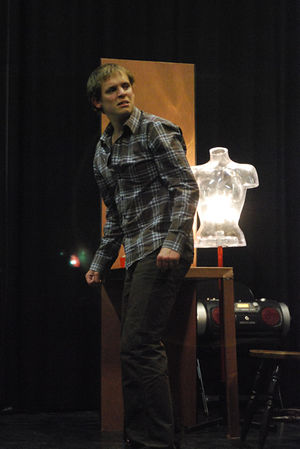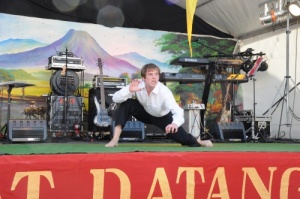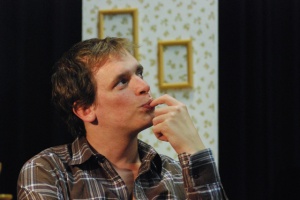User:Fako Berkers: Difference between revisions
Fako Berkers (talk | contribs) |
Fako Berkers (talk | contribs) (→Essays) |
||
| Line 40: | Line 40: | ||
* [[Media:NWMTrimester1Essay06.pdf|Trimester 1, draft 1]] | * [[Media:NWMTrimester1Essay06.pdf|Trimester 1, draft 1]] | ||
* [http://www.fakoberkers.nl/networkedmedia/essay1/ Trimester 1, final] | * [http://www.fakoberkers.nl/networkedmedia/essay1/ Trimester 1, final] | ||
* [[Media:PZIEssay2.9.pdf|Trimester 2, final]] | |||
==Study Log== | ==Study Log== | ||
Revision as of 14:19, 24 September 2011
Current thoughts
Momentarily I’m reading about the history of math. I took this subject, because I thought it would be relevant for the line of thought that I made in my last two essays.
I’m especially working with the consequences of digitalization. As the word says digit-alization is the process of translating phenomena into a numerical representation. Representing things in numbers has the advantage that you can perform algorithmic operations on the representations. A downside is that the simplification of reality that is inherit to a translation of reality in numbers may result in the loss of important parts of this reality. An example of this is that a simulation of walking is entirely based on a principle of competition and ignores possible other factors in the learning process like motivation/instinct other than aggression and self-generating properties of organisms. Another downside is that the algorithmic operations may distort the representations in a negative way, because the logic of the designers is failing. You see this in the way that some internet platforms handle privacy. Their logic in what is public and what not can be opposite to what an individual finds logical. Finally an unwanted side effect could be the influence that the mere presence of a digital system can have upon reality. For instance how much is Facebook changing the nature of friendships by being presence in between the communication among friends? In my opinion digitalizations should be discussed critically to minimize any negative consequences. To stimulate analysis I proposed to embody computer systems.
The history of math is interesting in this context because in the 19th and 20th century mathematicians have been busy with proving the fundamentals of math after the traditional fundaments were questioned with the discovery of new math (especially the non-euclidic math). As far as I understand that history now it ended with Turing who found (and mathematically proved) the limitations of what can be calculated. These conclusions may also point out the limitations of digital representations. I still need to think through what the conclusions of Turing may mean for computer systems that we see today. However I’m keen on continuing along the path that I have taken and want to read more before I come to conclusions. I also think that older math can be of great inspiration. For instance the division of discrete and continuous made by Pythagoras and the spiritual conclusions that he drew from this distinction.
Finally I think it’s exciting that lens based will be studying alongside us this year. I understood that after Turing discovered that algebra has it’s limitations he focused his genius mind on physics and the involvement of geometry in the self-generation of organisms. Video could be a very interesting tool for embodying such math. Think about the distortion that takes place with a fish-eye effect. You could say that the world inside this video is operating according to non-euclidic geometry. Especially now that some non-euclidic math seems to be failing in the relativity theory of Einstein (since it looks like particles can possibly travel faster than light) it is very relevant to visualize such mathematical principles and understand how they operate in relation to reality. However I should take things one step at a time.
Bio
I consider it my creative challenge to combine computer techniques with theatre in such a way that they compliment each other. In this work I'm fascinated by networks. I like to work with the internet as a medium, because it can bring people together. In theatre I'm also searching for (an ancient) connection; the often subconscious connection between humans, animals and the things around them.
Performing
As a child I used to perform for relatives and family. Once I held a speech for my grandparents anniversary in baby talk before I could speak. For years I followed improvisation classes besides my regular education and after secondary school I studied theatre at Hogeschool voor de Kunsten Utrecht (HKU). There I came into contact with who I consider to be very important teachers (two of which were classmates). I'm still learning a traditional martial-art called Pencak Silat (from Indonesia) from Charles Renoult and I'm improving my singing with Alan Razzak.
Programming
I started programming in Pascal when I was 13. Since then I've taken on a few languages, but I mainly work in PHP and Lingo (for Adobe Director). I create projectors to be used during theatre performances and build websites. Currently I'm interested to improve the CMS that even my mother can use and I would like to startup a bigger project where people can share extraordinary life experiences online.
Motto: “freedom lies in how you react to what people do to you”
Personal Sites
You can find my re-developed site at the link below. It works best with the newest generation of browsers. There are some small mistakes that I'll correct soon.
Thematic Project Portfolio
Essays
Study Log
Theory Session
Prototyping Updates
- Prototype 1: bonding synchronization automated
- Dynamic clapping music
- Simon Says on Arduino
- First letter poetry
- Markov Chain poetry
- Emotion chain
- Marx's beard



